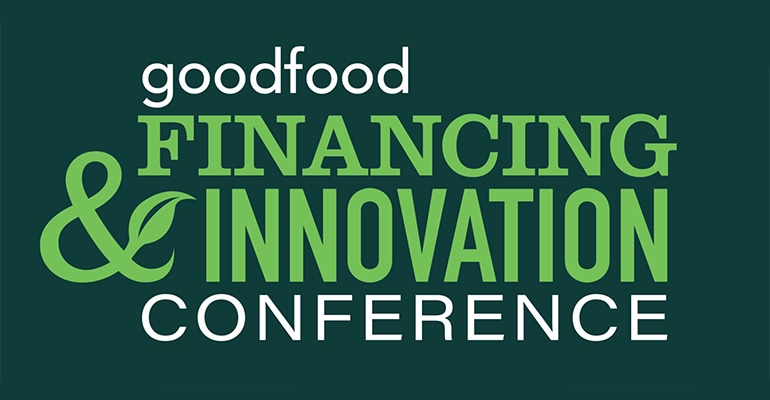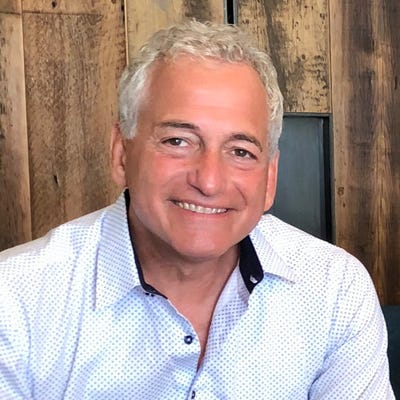10 takeaways from FamilyFarmed’s 2021 Good Food Financing and Innovation Conference
A wide range of experts spoke out about brick-and-mortar's survival, the megatrends behind today's new products, environmental responsibility and more at this virtual iteration of the conference.

“Conscious consumption” is a megatrend that has been accelerated by the pandemic, according to Anu Goel, president of Client Growth Solutions at SPINS. During the “Funding the New Generation” session that kicked off FamilyFarmed’s 2021 Good Food Financing and Innovation Conference (F&IC), Goel outlined four specific product priorities that consumers are increasingly demanding: good for their personal health, good for the planet, good for the animals and good for people (for example, fair trade products).
Goel then introduced featured speaker John Mackey—founder and for more than 40 years CEO of the Whole Foods Market company—by reminiscing about the impact his own first visit to a Whole Foods store had on him: “It was a game changer, the entire experience was nothing like I've ever had before: The colorful produce, the amazing unique brands and the knowledgeable staff.... It sparked my interest for a journey in this industry. And I’m sure Whole Foods sparked many people's journeys towards healthier living and becoming contributors in the industry.”
Mackey, for his part, gave a shoutout to everyone who has and continues to move the better for people, better for the planet sector forward. “I want to thank all my brothers and sisters that that are committed to this higher purpose of natural and organic food products and to make the world a better place,” Mackey said during his fireside chat with New Hope Network Senior Vice President Carlotta Mast, titled "Conscious Leadership in the Age of Amazon."
Later that day, Presence Marketing CEO Bill Weiland—the leading Good Food broker for more than 30 years and legendary industry trendspotter—weighed in with six dynamic categories from his company’s Bankable Trends report: keto, bone broth, pasture-raised/regenerative, plant-based, mushrooms and grain-free.
These high-level overviews were just some of the takeaways from the lineup of industry titans on the first day of the conference. FamilyFarmed has worked to present highly informative and engaging programs since the first F&IC in 2009. Yet this took even greater precedence this year as the pandemic prompted us to present F&IC online for the first time, hosted on New Hope Network’s Natural Products Expo Virtual platform.
The business-building energy of in-person networking, such a major asset to past live conferences, just was not possible. Perhaps more importantly, the 500-plus registrants needed to hear the perspectives of top Good Food sector leaders about the future of the industry as we emerge from the turmoil and uncertainty of the COVID-19 crisis.
We did our utmost to deliver.
After the Anu Goel and John Mackey segments, Chicago retail grocery legend Bob Mariano—former CEO of the Dominick’s chain, founder of Mariano’s, and now founder of the new-concept Dom’s Kitchen and Market—was featured in the next two panels: "The Future of Retail is Now!" with KeHE CEO Brandon Barnholt and me, and "A Grand Convergence: Retail, Restaurant, Delivery and Prepared Foods" with Dom’s Executive Chairman Jay Owen and CEOs Luke Saunders of Farmer’s Fridge and Danielle Drabkin of Pear Chef.
The next panel, titled "Investing in Interesting Times," featured five experts on the financing of better-for-you, better-for-the-planet products: Nick Giannuzzi of Giannuzzi Lewendon, Andy Whitman of 2x Consumer Products Growth Partners, Tracy Miedema of Presence Marketing, Brigette Wolf of Mondelēz International and Mark Thomann of Spiral Sun Ventures.
And the day’s last panel, titled "Growing Indoors: The Food Production Revolution," was moderated by Sanjeev Krishnan of S2G Ventures and provided perspectives from Jim Murphy, CEO of Grow Forward and MightyVine Tomatoes; Tim Heydon of Shenandoah Growers, Dr. Nate Storey of Plenty Inc. and Judy Thomas of Chicago’s social mission-driven Garfield Produce Company.
The program was capped by the Naturally Chicago Pitch Slam, which boasted a prize package of in-kind business services valued at more than $100,000. Lil Bucks, a company that makes toppings and snacks from nutrient-dense buckwheat seeds, took home the Grand Prize; Lorenzo’s Banana Pudding, a BIPOC- and woman-owned company, was the runner-up.
It was a challenge to trim down the many takeaways from the lineup mentioned above, but here are our top 10.
Pivoting during COVID-19
"With COVID, retailers adapted very quickly to the way the consumer was shopping. They went contactless as much as they could, and KeHE helped them to achieve that. Around the perimeter they adopted contactless packaging on ready to eat. The move to pick and go was the single biggest move. The industry also needed to ensure that the supply chain is in place, working with suppliers, manufacturers, distributors and retailers to connect the dots and keep product on the shelf." — Brandon Barnholt, CEO, KeHE Distributors
"Our intent was always to really continue to leverage the brand and the assets around production distribution beyond the fridge [the healthy food vending machine that built the fast-growing business]. So it really accelerated that… If you're right next to a fridge we’ll direct you there. If home delivery’s the best option, we’ll direct you there. If Danielle or Bob are selling our products through their channel, we’ll direct you to them. So really creating that mobile-first experience, and then it changes the unit economics." — Luke Saunders, Farmer’s Fridge founder and CEO
Social values are business priorities
"Social justice, climate justice, climate change and figuring out what your brand's role is relative to those things, those issues are not going away. They're not going to go away, because part of what happened post-George Floyd is that we started to learn the impact of such a large percentage of the consumer base being Millennials and Gen Z." — Ryan Pintado-Vertner, Smoketown Consulting
"We created our Go To Market program. We want to catch some of those early-stage entrepreneurs on the South and West sides of Chicago. We're supporting these businesses and we're going to help them give you everything that you need to be successful in your store if you just give them a chance, and so these small entrepreneurs don't have to go around and hit every door knock on it and more than likely getting to 'no' because the buyers are so busy." — Shelby Parchman, FamilyFarmed COO and Good Food Accelerator managing director
John Mackey and the Whole Foods-Amazon marriage
"Overall, if I could do it all over again, I probably would make the same choice I made three and a half years ago because it was good for each of our stakeholders. Our customers have gotten significantly lower prices, team members are getting higher compensation, and many of suppliers that started at Whole Foods have grown their business at Amazon. Whole Foods has doubled down on local and increased it. Investors have made more money. We still have our foundations and are still committed to local philanthropy. And lastly we are still driven by our core values and our mission is still intact.” — John Mackey, founder and CEO, Whole Foods Market
Big trends and eternal verities
"From an investor standpoint, I think you got to be aware of the megatrends, but it's still the same basics that it ever was. You want brands that stand for something that people want and that have an ability to really solve a need that doesn't exist, to solve a need and with a product that may not have already exist in the marketplace, and that's who's going to win." — Steve Koch, founder, Koch Family Foundation
Big food moves toward better food
"We try to invest to acquire, so that came obviously full fruition with our minority stake in Hu [a chocolate company] becoming an acquisition. What COVID has exposed is the importance of physical health and immunity. People want real food to be the healer. There is definitely a rise of interest in functional food as consumers are getting more familiar with it." — Brigette Wolf, head of SnackFutures, Mondelēz International
Brick-and-mortar is here to stay
"I think my view is it's critical to establishing the brand. People still want to have that opportunity to come to a facility, to have a piece of education going on. Teach me about new food, teach me about wine, teach me how to pair this cheese and this wine with this type of fruit... So the trip to the store is not a trip of drudgery. It's a trip of excitement, interest and learning." — Bob Mariano of Dom’s Kitchen and Market
Indoor farming is growing fast
"Seven years ago, raising money to build a greenhouse wasn't the easiest thing in the world in America. If you were in the Netherlands you could do it but not here. So now we've gotten to the point where it's kind of accepted practice and is very disruptive… I am extremely optimistic about the business as we get better and better at it quarter after quarter in terms of efficiencies and equality." — Jim Murphy, founder and CEO of Grow Forward and MightyVine Tomatoes.
Good food’s truth keeps marching on
"I'll put the challenge to the next generation to evolve the industry and take it to another level, which means getting back to the original vision of the early leaders in this movement. Originally, this was an agricultural revolution of food grown closer to nature where farmers were taking care of the soil and maintaining the purity of the water. We wanted food that was in its natural state and less processed. I hope the next generation will re-embrace this intent." — John Mackey
Jim Slama is founder and CEO of FamilyFarmed and founder of its Good Food Accelerator and Naturally Chicago programs. This article was co-written with Bob Benenson of FamilyFarmed.
About the Author(s)
You May Also Like




